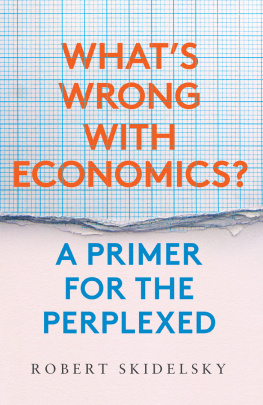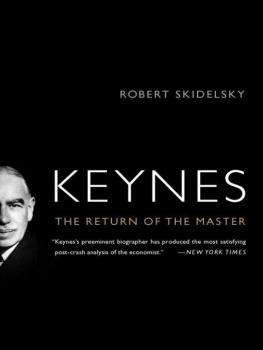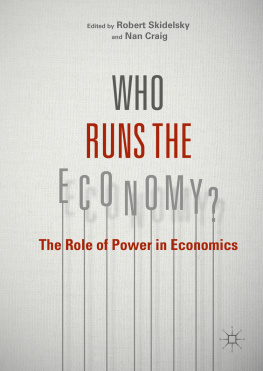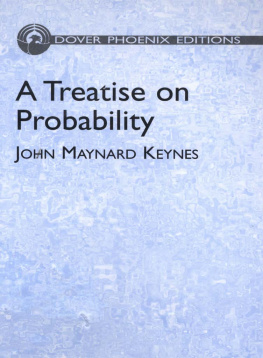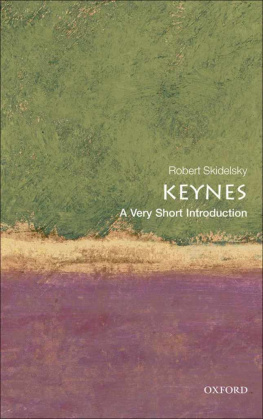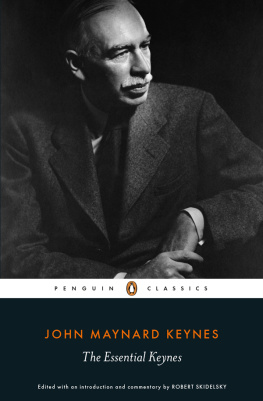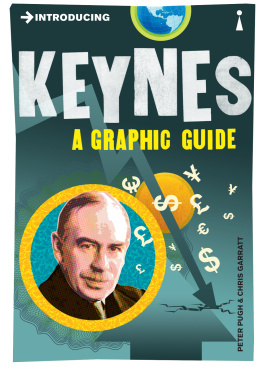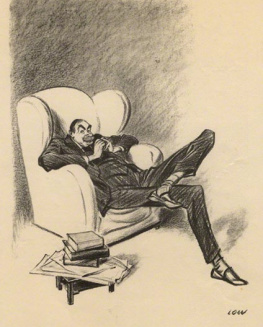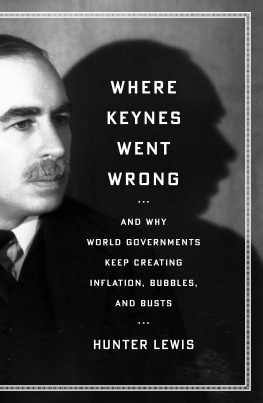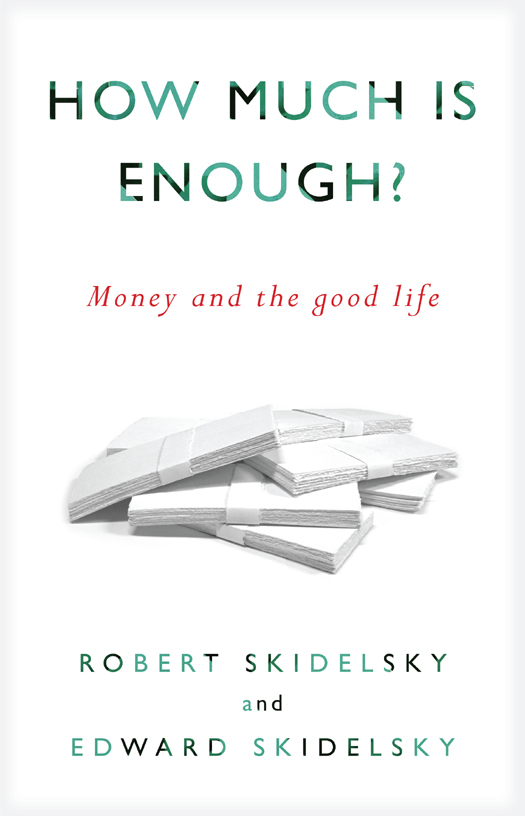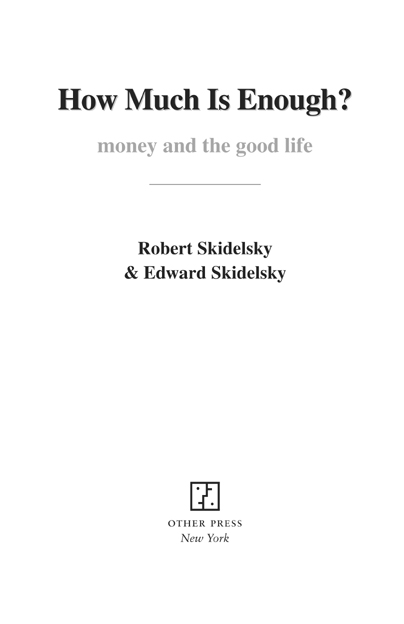ALSO BY ROBERT SKIDELSKY
Keynes: The Return of the Master (2009)
John Maynard Keynes 18831946: Economist, Philosopher, Statesman (2004)
John Maynard Keynes: Fighting for Britain, 19371946 (2000)
2002 Arthur Ross Book Award Gold Medal
2001 Lionel Gelber Prize
The World After Communism: A Polemic for our Times (1995)
Interests and Obsessions: Historical Essays (1993)
John Maynard Keynes: The Economist as Saviour, 19201937 (1992)
John Maynard Keynes: Hopes Betrayed, 18831920 (1983)
Oswald Mosley (1975)
English Progressive Schools (1969)
Politicians and the Slump: The Labour Government of 19291931 (1967)
ALSO BY EDWARD SKIDELSKY
Ernst Cassirer: The Last Philosopher of Culture (2009)
Copyright 2012 Robert Skidelsky and Edward Skidelsky
Production Editor: Yvonne E. Crdenas
An excerpt from the appeared in Bloomberg View on June 4 and 8, 2012.
All rights reserved. No part of this publication may be reproduced or transmitted in any form or by any means, electronic or mechanical, including photocopying, recording, or by any information storage and retrieval system, without written permission from Other Press LLC, except in the case of brief quotations in reviews for inclusion in a magazine, newspaper, or broadcast. For information write to Other Press LLC, 2 Park Avenue, 24th Floor, New York, NY 10016.
Or visit our Web site: www.otherpress.com
The Library of Congress has cataloged the printed edition as follows:
Skidelsky, Robert Jacob Alexander, 1939
How much is enough? : money and the good life / Robert Skidelsky and Edward Skidelsky.
p. cm.
Includes bibliographical references.
eISBN: 978-1-59051-508-2
1. Wealth. 2. EconomicsSociological aspects. I. Skidelsky, Edward.
II. Title.
HB 251. S 64 2012
306.3dc23
2012008052
v3.1
To Hugo
That his possibilities may live up to the hopes
Keynes had for his grandchildren
Nothing is enough for the man to whom enough is too little.
Epicurus
Contents
Preface
As we were writing the book, friends of ours often asked us, half-jokingly, Are you going to tell us how much you think is enough? We found it sensible to riposte by asking, as if in the spirit of scholarly inquiry, How much do you think is enough? We often got the answer Enough for what? to which we replied, Enough to live a good life. This sometimes did elicit a stab at a number, though, as was to be expected, the number varied markedly according to age, circumstances and nationality. The fact is, of course, that one can only hope to get a meaningful and perhaps binding answer to the question from people who accept that there is such a thing as a good life, independent of their own subjective desires. The purpose of this book is to persuade the reader that such a thingthe good lifedoes exist and can be known, and that we ought to strive to live it. How much money we need to live it comes at the end of the argument, not at the beginning.
Many people have helped us. We are extraordinarily grateful to Armand Clesse, director of the Luxembourg Institute for European and International Studies, for organizing a symposium on the book in Luxembourg on May 2728, 2011. Armand, who chaired in his usual vivacious style, had assembled an interdisciplinary galaxy: Michael Ambrosi, Christian Arnsperger, Tom Bauler, Mathias Binswinger, Ulrich Brand, Isabelle Cassiers, Aditya Chakrabortty, Andrew Hallam, Mario Hirsch, Sir Anthony Kenny, Charles Kenny, Guy Kirsch, Serge-Christophe Kolm, Axel Leijonhufvud, Felix Martin, Matt Matravers, John Milbank, Adrian Pabst, Guy Schuller, Larry Siedentop, Alfred Steinherr, Henryk Szlajfer and Paul Zahlen. They read an early draft of the manuscript, and some even braved the volcanic ash then hovering over Europe to come. We received much encouragement and stimulus from their suggestions.
Our UK agent Michael Sissons and our UK publisher Stuart Proffitt made notable contributions to the emergence of the proposal, and in nudging the book kindly but firmly towards publication, as did our enthusiastic American publisher Judith Gurewich, whose e-mails we will long remember. They all encouraged us to break academic cover and come out clearly with our own views.
Our warmest thanks go to the following for reading the whole or part of drafts of How Much Is Enough? and, by their comments and criticisms, helping to improve its arguments: Perry Anderson, Tony Bicat, Carmen Callil, Meghnad Desai, Robin Douglass, Pavel Erochkine, Richard Fynes, Peter Pagan, Pranay Sanklecha, Richard Seaford, Augusta Skidelsky, Will Skidelsky and Wu Junqing.
We thank Pete Mills and Christian Westerlind Wigstrom of Roberts Centre for Global Studies for their unstinting help with research and criticism. Pete in particular played a big part in assembling the data and shaping the argument of . Donald Poon provided welcome assistance as a summer intern on his way to the LSE. Our thanks go to the Librarian and staff of the House of Lords for meeting our insatiable demand for books and articles.
Above all, we enjoyed working together. The two months we spent in Languedoc in April/May 2011, writing and talking about the book, was an enormously happy time, a voyage of discovery, not least about each other: in its setting, a speck of the good life, for both of us.
Robert and Edward Skidelsky
In a previous book, Robert Skidelsky did venture to name a sum that the economist John Maynard Keynes would have considered enough to satisfy average needs: 40,000 or $66,000 or 46,000 a year (in todays money). See Robert Skidelsky, Keynes: The Return of the Master, 2nd edn. (London: Penguin, 2010), p. 142, which also reveals the basis of the calculation. But Keynes was assuming a more settled idea of what the good life was than is now true, and less pressure to lead a bad life than now exists.
List of Charts
Keyness forecast
Growth since Keynes
Weekly hours since Keynes
Hours of work since 1983
Income share of the richest 1 percent
GDP per head and life satisfaction
Happiness according to income position in the UK
Happiness and income by country
Alcohol-related deaths in the UK
Obesity in the UK
Unemployment in OECD countries
Income inequality since 1977
Distribution of wealth in the UK
Marriage and divorce in the UK
Attendance at cultural events in the UK
Introduction
This book is an argument against insatiability, against that psychological disposition that prevents us, as individuals and as societies, from saying enough is enough. It is directed at economic insatiability, the desire for more and more money. It is chiefly directed at the rich parts of the world, which may be reasonably thought to have enough wealth for a decent collective life. For the poor parts of the world, where the mass of the people still live in great poverty, insatiability is a problem for the future. But in rich and poor societies alike, insatiability can be seen wherever the opulence of the very rich runs wildly ahead of the means of existence of the many.
Marxists contend that economic insatiability is a creation of capitalism, which will disappear with its abolition. Christians argue that it is the product of original sin. Our own view is that it is rooted in human naturein the disposition to compare our fortune with that of our fellows and find it wantingbut has been greatly intensified by capitalism, which has made it the psychological basis of an entire civilization. What was once an aberration of the rich is now a commonplace of everyday life.


